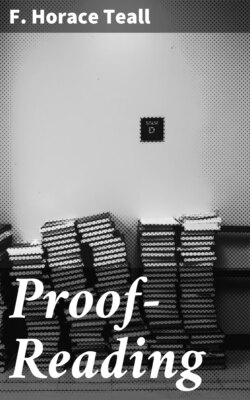Читать книгу Proof-Reading - F. Horace Teall - Страница 3
ОглавлениеPROOF-READING.
CHAPTER I.
THE PROOF-ROOM.
THOUGH commonly acknowledged theoretically, the relative importance of good proof-reading is often practically unrecognized. Doubtless few of those who employ readers will assent to this averment, and the reason for their non-assent is also the basis of the assertion. Usually the proof-room is under the authority of a general foreman or superintendent, often not a good proof-reader himself, and who must necessarily devote most of his time to other matters. If the foreman is really competent to read proof, he will manage to secure and keep a force of good readers with less trouble than those have who are not so well fitted to judge the work done.
When good work is to be done—and where is the man who avowedly does not desire good work?—accomplished workmen are required, not properly in any one department alone, but all through; and perhaps this fact is partly responsible for the notion, not uncommon, but erroneous and costly, that almost any intelligent person can read proof.
Few persons realize fully the accomplishment and acuteness of perception necessary for the best proof-reading. He is the best reader who, in addition to mechanical experience and accuracy, has a comprehensive education and can apply it practically. Of course, we can not expect our reader to know absolutely everything, but he should at least know enough to suspect error when there is evident occasion for suspicion, and challenge it for the author’s attention when that is possible. He should have general information sufficient to enable him to correct absolute error when he can not refer the matter to author or editor—a contingency frequently arising in newspaper-work.
Above all, the thoroughly accomplished proof-reader will know enough not to make changes in what is written when he has no right to do so. He will often know that what is written can not be right, and yet will have sense enough not to alter it without authorization. He will also have sense enough to assume a certain amount of authority on proper occasion, as in the case of an evident slip in the copy of work that has a set form. A good example is work like the definitions of verbs in the “Century Dictionary.” In these definitions the word to is used only with the first clause. The good proof-reader will have the word omitted even if it does happen to be in the copy, notwithstanding the strictest orders to follow copy; in fact, this is so plain a case that a very good compositor even would not set the word in the wrong place. Another forcible instance comes to hand at the moment of writing, in a letter written by a New York proof-reader, who mentions Assemblyman Amos J. Cummings. Mr. Cummings never was an Assemblyman. He is a Congressman, and Chairman of one of the important Congress committees; moreover, he is an old-time New York compositor. When he was an editor on a New York paper another present Congressman was reporting Brooklyn news for the same paper. Almost every Brooklyn item sent in at that time had, in the writing, parallel streets reported as crossing, or cross-streets as being parallel; and these errors were frequently corrected in the proof-room.
The proof-reader who can and does make such corrections is much better for such work than one who merely catches typographical errors, even if he sometimes allows a wrong letter to pass in reading. Certainly a New York reader, especially a union man, should know better than to write of Assemblyman Cummings; and it would be well for all proof-readers to be sufficiently up in current affairs to correct the error, though it would not be fair to insist upon such correction as part of the reader’s qualification.
The present difficulty will never cease until the money value of good proof-reading is better recognized than it ever has been. At least one union in this country has always made a maximum weekly scale, and insisted upon classing readers with all other hands, at the same wages. Employers should insist upon paying as much over the union scale as they choose, and will always find it conducive to their interest to pay liberally for proof-reading and demand first-class work.
If any one is fortunate enough to have a first-class proof-reader in his employ, he will be foolish to let that reader go, if money—within reasonable bounds—will keep him. Fifty men may try to fill the place and fail before another really competent man is found.
A large proof-room should have its own foreman—not merely a head reader, but one actually in authority, just as any foreman should be, and with higher pay than the other readers have, and also with the chief responsibility. The room must, of course, be subject to the general foreman with regard to many details, whether it has a separate foreman or not; but, whoever is in charge, the readers should not be too much restricted in small, formal matters. An extreme instance that will illustrate practically what is meant by this arose through strict orders not to change anything from copy, too literally obeyed. A letter was missing from a word always spelled the one way, and the reader queried its insertion. He was an ordinarily good reader, too, who certainly had not the natural habit of doing anything stupid.
Undoubtedly better work will be turned out where there is no possibility of such queries being made, for the necessity of making them, under orders, imposes upon the reader an unfair burden of useless watchfulness that inevitably rivets his attention where it is not needed, and draws it away from matters that demand the utmost care.
